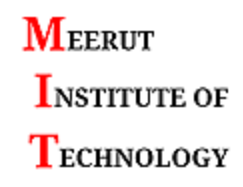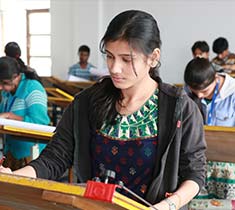|
MEERUT INSTITUTE OF TECHNOLOGY, MEERUT |
|
Mechanical Engineering (40) |
|
III Semester |
|
S. N. |
Subject Code |
Subject Name |
Outcomes |
|
1 |
KVE301 |
Universal Human Values |
CO1 |
Understand about the need of value education and harmony in self, family, society and nature. |
|
CO2 |
Apply the understanding of value education to ensure harmony at all the four levels of living. |
|
CO3 |
Analyze about self, feelings in relationship, society and relevence of nature. |
|
CO4 |
Evaluate their participation (Thought, Behaviour, Work, Realization) at all the four levels of living. |
|
CO5 |
Develop their emotional, social and professional competence. |
|
2 |
KOE033 |
Energy Science and Engineering |
CO1 |
understand about the basics of energy formation and its usage in one way or the other. |
|
CO2 |
understand the basic fundamentals of Nuclear Energy. |
|
CO3 |
understand solar energy formation and its uses. |
|
CO4 |
get detailed knowledge of renewable and non renewable energy resources. |
|
CO5 |
understand and recognize numerous types of Energy conservation norms at national and international level. |
|
3 |
KME301 |
Thermodynamics |
CO1 |
Understand the basic concepts of thermodynamics, psychrometry and refrigeration. |
|
CO2 |
Understand the basic laws of thermodynamics and their corollaries. |
|
CO3 |
Understand the behaviour pure substances and various phase diagram |
|
CO4 |
Understand the working of rankine power and various refrigeration cycles. |
|
CO5 |
Apply the basic laws of thermodynamics for the different processes in open and closed systems. |
|
CO6 |
Apply the basic laws of thermodynamics to calculate the performance of power and refrigeration cycles. |
|
4 |
KME302 |
Fluid Mechanics and Fluid Machines |
CO1 |
Understand the concept of fluid , types of fluid flow, boundary layer and minor losses. |
|
CO2 |
Understand the concept of mass, momentum and energy equations in fluid flow systems. |
|
CO3 |
Apply dimensional analysis to predict physical parameters that influence flow in fluid mechanics. |
|
CO4 |
Apply the concept of Impact of jet on Impulse turbine and reaction turbine.. |
|
CO5 |
Apply the concept centrifugal force on centrifugal pump and reciprocating action on reciprocating pump. |
|
5 |
KME 303 |
Materials Engineering |
CO1 |
Understand crystallographic structure and mechanism of deformation in materials. |
|
CO2 |
Understand the principles of phase evolution and development of binary Iron-Iron Carbide phase diagram. |
|
CO3 |
Understand the chemical composition, properties and applications of commercial ferrous and non-ferrous alloys. |
|
CO4 |
Apply theories of static and dynamic failure with consideration of fracture mechanics and NDT techniques. |
|
CO5 |
Apply heat treatment processes for altering the properties of plain carbon steels. |
|
6 |
KNC302 |
Python Programming |
CO1 |
Understand the concept of python programming |
|
CO2 |
Apply the concept of conditions, loops and data structures in python program |
|
CO3 |
Apply the concept of functions, modules, recursion through python program |
|
CO4 |
Apply the concept of abstract data type, exception handling and file handling through python program |
|
CO5 |
Apply the concept of searching, sorting and merging through python program |
|
7 |
KME 351 |
Fluid Mechanics Lab |
CO1 |
Determine the coefficient of discharge of the given venturimeter/orifice meter. |
|
CO2 |
Determine the coefficient of discharge of the given bend meter. |
|
CO3 |
Determine Coefficient of Friction factor for a given pipe line. |
|
CO4 |
Verification of Bernoulli’s Theorem |
|
CO5 |
Verify momentum equation using Impact of Jet on Vanes. |
|
CO6 |
Determine Meta-centric height of a given ship model |
|
8 |
KME 352 |
Material Testing Lab |
CO1 |
Understand crystallographic structure and mechanism of deformation in materials. |
|
CO2 |
Understand the principles of phase evolution and development of binary Iron-Iron Carbide phase diagram. |
|
CO3 |
Understand the chemical composition, properties and applications of commercial ferrous and non-ferrous alloys. |
|
CO4 |
Apply theories of static and dynamic failure with consideration of fracture mechanics and NDT techniques. |
|
CO5 |
Apply heat treatment processes for altering the properties of plain carbon steels. |
|
9 |
KME 353 |
Computer Aided Machine Drawing-I Lab |
CO1 |
Apply the common conventional symbols for representation of machine components and materials |
|
CO2 |
Apply concept of orthographic projections and isometric projection to make a mechanical component |
|
CO3 |
Draw designation of threads, bolted joint, riveted joints and free hand sketch of mechanical components |
|
CO4 |
Draw assembly drawing of Knuckle joint and plumber block. |
|
CO5 |
use computer and CAD software fo modelling mechanical components. |
|
10 |
KME 354 |
Mini Project or Internship Assessment |
CO1 |
To give a platform for the students to apply the theoretical knowledge they gained during the course and conduct design working models. |
|
CO2 |
To enable the students to use different design/coding platforms for design and analysis of project. |
|
IVSemester |
|
11 |
KAS402 |
Maths IV |
CO1 |
Remember the concept of partial differential equation and to solve partial differential equations |
|
CO2 |
Analyze the concept of partial differential equations to evaluate the problems concerned with partial differential equations |
|
CO3 |
Understand the concept of correlation, moments, skewness and kurtosis and curve fitting |
|
CO4 |
Remember the concept of probability to evaluate probability distributions |
|
CO5 |
Apply the concept of hypothesis testing and statistical quality control to create control charts |
|
12 |
KNC401 |
Computer System Security |
CO1 |
Able to understand the basic Concepts of Computer System Security & Hijacking. |
|
CO2 |
Able to understand the basics of security approaches, (such as confidentiality) |
|
CO3 |
Able to understand basics of Architectures Principles and Web Security Issues. |
|
CO4 |
Able to understand various protocols to establish TCP/IP connections with security features. |
|
CO5 |
Able to apply the concepts of Cryptography Techniques and Digital Signature using Keys. |
|
13 |
KME 401 |
Applied Thermodynamics |
CO1 |
Understand the various types of fuels, thier properties and combustion process |
|
CO2 |
Understand construction and working of various components used in power generation system. |
|
CO3 |
Understand the working of different power cycles and jet propulsion. |
|
CO4 |
Apply the basic laws to calculate performance parameters of different power cycles. |
|
CO5 |
Apply the basic laws of thermodynamics to nozzles and turbine. |
|
CO6 |
Analyze the various processes and cycles of power generation system. |
|
14 |
KME-402 |
ENGG. MECHANICS |
CO1 |
Understanding the force sytem, Moment of the force and couple. |
|
CO2 |
Understending the reaction, shear force, bending moment acting on a beam and truss element. |
|
CO3 |
Apply center of gravity, center of Mass,Centroid and monent of inertia of curves, areas and volume. |
|
CO4 |
Apply Force, Moment, Couple, Reaction, Shear force and Bending Moment on Beam and Truss element. |
|
CO5 |
Apply the kinematics/kinetics of rigid bodies and friction. |
|
CO6 |
Apply stress, strain on different element member, Bending of beam and Torsion of circular section or member. |
|
15 |
KME 403 |
Manufacturing Process |
CO1 |
Understand the basic concepts of metal casting, forming and powder metallurgy. |
|
CO2 |
Explain the causes of defects in metal casting and forming processes. |
|
CO3 |
Explain the mechanics of chip formation, cutting tool geometry and working of machine tools for different finishing processes. |
|
CO4 |
Apply the concepts of metal cutting to determine relationship among cutting forces, power required and tool life. |
|
CO5 |
Understand the various conventional welding processes, welding defects and formation & control of Heat Affected Zone. |
|
CO6 |
Understand the principles of operation of unconventional metal cutting processes. |
|
16 |
KAS401 |
Technical Communication |
CO1 |
Understand the fundamentals of all modes of technical communication along with their elements, dimensions, and flow. |
|
CO2 |
Understand to write pragmatic and impactful reports, research papers, technical proposals, and resumes. |
|
CO3 |
Understand public speaking strategies, techniques and their different styles. |
|
CO4 |
Grasp the essentials of interviews & group discussions and skills required to face them confidently. |
|
CO5 |
Comprehend the grammatical and oral aspects of the English language as an effective tool of communication |
|
17 |
KME 451 |
Applied Thermodynamics Lab |
CO1 |
Demonstrate the working of Fire tube and Water tube boilers. |
|
CO2 |
Demonstrate the working of Petrol & Diesel engines using basics of thermodynamics. |
|
CO3 |
Demonstrate the working principle of Steam Engine. |
|
CO4 |
Demonstrate the working principle of Impulse and Reaction turbine. |
|
18 |
KME 452 |
Manufacturing Technology Lab |
CO1 |
Study and practice on Electrical and Electronics basics and performing the soldering and desoldering in PCB usin in wire housing and electtrical circuits.. |
|
CO2 |
Practice on manufacturing of components using workshop trades including fitting, carpentry shop. |
|
CO3 |
Practice on manufacturing of components using workshop trades including foundry and welding shop. |
|
CO4 |
Identify and apply suitable tools for machining processes including turning, facing,chamfering,taper turning,knurling and grooving. |
|
CO5 |
Apply suitable tools in plastic moulding and glass cutting. |
|
19 |
KME 453 |
Computer Aided Machine Drawing-II Lab |
CO1 |
Interpret views from orthographic projection using concept of first angle projection |
|
CO2 |
Draw assembly drawing of lathe tool post, tail stock, stuffing box, connecting rod and safety valve on drawing sheets. |
|
CO3 |
Generate production drawings with information about Limits, fits and tolerances. |
|
CO4 |
Develop 3D drawings of simple machine parts by 3D modeling software SolidEdge |
|
V Semester |
|
20 |
KME 503 |
Industrial Engineering |
CO1 |
Understand the concept of production system, productivity, facility and process planning in various industries |
|
CO2 |
Apply the various forecasting and project management techniques |
|
CO3 |
Apply the concept of break?even analysis, inventory control and resource utilization using queuing theory |
|
CO4 |
Apply principles of work study and ergonomics for design of work systems |
|
CO5 |
Formulate mathematical models for optimal solution of industrial problems using linear programming approach |
|
21 |
KME501 |
Heat & Mass Transfer |
CO1 |
To understand the fundamental of heat and mass transfer. |
|
CO2 |
To apply the concept of steady-state and unsteady state heat conduction. |
|
CO3 |
To apply the concept of thermal behavior of fins. |
|
CO4 |
To apply the concept of forced and free convection. |
|
CO5 |
To apply the concept of radiation for black and non-black bodies. |
|
CO6 |
To analyze the thermal analysis of heat exchanger. |
|
22 |
KME 502 |
Strength of Material |
CO1 |
Understand the concept of stress and strain under different conditions of loading |
|
CO2 |
Determine the principal stresses and strains in structural members |
|
CO3 |
Determine the stresses and strains in the members subjected to axial, bending and torsional loads |
|
CO4 |
Apply the concepts of stresses and strain in solving problems related to springs, column and pressure vessels |
|
CO5 |
Calculate the slope, deflection and buckling of loaded members |
|
CO6 |
Analyze the stresses developed in straight and curved beams of different cross sections |
|
23 |
KME 051 |
Computer Integrated Manufacturing |
CO1 |
Understand the basic concepts of automation, computer numeric control machining |
|
CO2 |
Understand the algorithms of line generation, circle generation, transformation,
curve, surface modeling and solid modeling |
|
CO3 |
Understand group technology, computer aided process planning, flexible
manufacturing, Industry 4.0, robotics |
|
CO4 |
Understand information system and material handling in CIM environment, rapid prototyping |
|
CO5 |
Apply the algorithms of line & circle generation and geometric transformations |
|
CO6 |
Develop CNC program for simple operations |
|
24 |
KME 055 |
Advance welding |
CO1 |
Understand the physics of arc welding process and various operating characteristics of welding power source |
|
CO2 |
Analyse various welding processes and their applications. |
|
CO3 |
Apply the knowledge of welding for repair & maintenance, along with the weldability of different materials. |
|
CO4 |
Apply the concept of quality control and testing of weldments in industrial environment. |
|
CO5 |
Evaluate heat flow in welding and physical metallurgy of weldments. |
|
25 |
KME551 |
Heat & Mass Transfer Lab |
CO1 |
Apply the concept of conduction and pool boiling heat transfer. |
|
CO2 |
Apply empirical correlations for both forced and free convection to determine the value of convection heat transfer coefficient. |
|
CO3 |
Apply the concept of radiation heat transfer for black and grey body. |
|
CO4 |
Analyze the thermal behaviour of parallel and counter flow heat exchangers. |
|
CO5 |
Conduct thermal analysis of a heat pipe. |
|
26 |
KME 552 |
Python Lab |
CO1 |
Apply conditional statement, loops condition and functions in python program |
|
CO2 |
Solve mathematical and mechanical problems using python program |
|
CO3 |
Plot various type of chart using python program |
|
CO4 |
Analyze the mechanical problem using python program |
|
27 |
KME 553 |
Internet of Things Lab |
CO1 |
Understand Internet of Things and its hardware and software components |
|
CO2 |
Interface I/O devices, sensors & communication modules influencing combustion chamber design. |
|
CO3 |
Remotely monitor data and control devices |
|
CO4 |
Design prototype of IoT based smart system |
|
CO5 |
Develop IoT based projects for real life problem |
|
28 |
KME 554 |
MINI PROJECT |
CO1 |
Identify and formulate problems to solve issues for benefit of society. |
|
CO2 |
Develop design skill for solutions to basic engineering problems. |
|
CO3 |
Impart skills in preparing brief technical report describing the project and results. |
|
CO4 |
Create an ability to work collaboratively in team and contribute individually. |
|
29 |
KNC501 |
Constitution of India, Law and Engineering |
CO1 |
To acquaint the students with legacies of constitutional development in India and help them to understand the most diversified legal document of India and philosophy behind it. |
|
CO2 |
To make students aware of the theoretical and functional aspects of the Indian Parliamentary System. |
|
CO3 |
To channelize students’ thinking towards basic understanding of the legal conceptsand its implications for engineers. |
|
CO4 |
To acquaint students with latest intellectual property rights and innovation environment with related regulatory framework |
|
CO5 |
To make students learn about role of engineering in business organizations and e-governance |
|
VI Semester |
|
30 |
RAS601 |
INDUSTRIAL MANAGEMENT |
CO1 |
understand the scope of industrial management and basic concept of production, productivity and industrial ownership. |
|
CO2 |
understand the Scientific management techniques. |
|
CO3 |
Apply the concept of work measurement and inventory control models. |
|
CO4 |
Apply the Quality Control methods for variables and attributes. |
|
CO5 |
Apply the project management network analysis with CPM and PERT techniques. |
|
31 |
RUC-601 |
Cyber Security |
CO1 |
Students will be able to understand the concepts of information system and cyber security. |
|
CO2 |
Students will be able to understand different security threats. |
|
CO3 |
Students will be to understand the requirements for developing secure softwares. |
|
CO4 |
Students will be able to understand the information security policies and standards . |
|
CO5 |
Students will be able to apply different Cryptographic techniques. |
|
32 |
RME601 |
Fluid Machinery |
CO1 |
Describe the fundamentals of fluid machinaries. |
|
CO2 |
Understand construction and working principle of hydraulic turbines. |
|
CO3 |
Understand construction and working principle of pumps (centrifugal, positive displacement and jet). |
|
CO4 |
Determine the performance parameters and characteristics of impulse and reaction turbine. |
|
CO5 |
Determine the performance parameters and characteristics of pump. |
|
CO6 |
Calculate the different parameter for flat and curved blades of jet using Eulers and momentum equation. |
|
33 |
RME602 |
Theory of Machines |
CO1 |
Understand the principles of kinematics and dynamics of machines. |
|
CO2 |
Calculate the velocity and acceleration for 4-bar and slider crank mechanism (by developed VA diagram) |
|
CO3 |
Develop cam profile for followers executing various types of motions |
|
CO4 |
Apply the concept of gear, gear train and flywheel for power transimission |
|
CO5 |
Apply dynamic force analysis for slider crank mechanism and balance rorating and reciprocating masses in machines. |
|
CO6 |
Apply the concepts of governors in fluctuation of load and brake & dynamometer in power transmission |
|
34 |
RME603 |
Machine Design-II |
CO1 |
Explain the fundamental of gears, bearing and IC engine parts. |
|
CO2 |
Understand design procedure of gears, bearings and IC engine components. |
|
CO3 |
Apply the basic concepts for design of gears, bearings and IC engine parts. |
|
CO4 |
Analyze the design of various gears and bearings against different types of loads including thermal considerations |
|
CO5 |
Analyze the design of all I C engine componets to meet the required specifications. |
|
35 |
RME061 |
Refrigeration & Air-conditioning |
CO1 |
Understand the basics concepts of Refrigeration & Air-Conditioning. |
|
CO2 |
Explain the construction and working of various components in Refrigeration & Air-Conditioning systems. |
|
CO3 |
Understand the different types of RAC systems with their respective applications. |
|
CO4 |
Apply the basic laws to the thermodynamic analysis of different processes involved in RAC systems. |
|
CO5 |
Apply the basic concepts to calculate the COP and other performance parameters for different RAC systems |
|
CO6 |
Analyze the effects of performance parameters on COP. |
|
36 |
RME651 |
Fluid Machinery Lab |
CO1 |
Determine the impact force of water jet on flat and hemispherical plates. |
|
CO2 |
Demonstrate the working principle and estimate efficiency of impulse and reaction turbines. |
|
CO3 |
Demonstrate the working principle and estimate efficiency of different types of pumps. |
|
CO4 |
Demonstrate the working principle of hydraulic devices. |
|
37 |
RME652 |
Theory of Machines Lab |
CO1 |
Implement inversion of mechanisms to obtain desired motion |
|
CO2 |
Apply cam-follower mechanism to get desired motion of follower. |
|
CO3 |
Apply the concepts of gears and gear train to get desired velocity ratio for power transmission. |
|
CO4 |
Apply the concept of governors to control the fuel supply in engine. |
|
CO5 |
Demonstrate brake and clutches in automobiles |
|
CO6 |
Determine the critical speed of a shaft |
|
38 |
RME653 |
Design and Simulation Lab II |
CO1 |
Design the mechanical components using C programming. |
|
CO2 |
Design the mechanical components using modelling software. |
|
CO3 |
Create a mini project on designing of IC engine components. |
|
39 |
RME654 |
Refrigeration & Air Conditioning Lab |
CO1 |
Determine the performance of refrigeration and air-conditioning systems. |
|
CO2 |
Apply the concept of psychometry on air washer. |
|
CO3 |
Interpret the use of different component and control systems in refrigeration and Air-conditioning systems. |
|
CO4 |
Demonstrate the working of window air conditioner |
|
VII Semester |
|
40 |
ROE074 |
Understanding the Human Being Comprehensively – Human Aspirations and its Fulfillment |
CO1 |
To help the students to understand the basic human aspirations and their fulfillment in the light of resolution |
|
CO2 |
To facilitate the competence of the students to understand the harmony of the human being in nature or existence. |
|
CO3 |
To help the students to understand the activities and potentialities of the self and reasons for harmony or contradiction in the self itself. |
|
CO4 |
To define the process of inner evolution, specifically awakening to activities of the Self: Realization, Understanding and Contemplation in the Self |
|
CO5 |
To help the students to understand different aspects of All-encompassing Resolution, leading to harmony at all levels from self to Nature and entire Existence. |
|
41 |
RME-075 |
Operations Research |
CO1 |
Understand the basic concept of Operation Research and modelling of a real life problem within given constraints. |
|
CO2 |
Apply the concept of inventory in industry. |
|
CO3 |
Apply the concept of Network Techniques in project management. |
|
CO4 |
Apply the concept of queuing models and theory of games in real life problems. |
|
CO5 |
Generate the optimal solution of transportation and assignment problems. |
|
CO6 |
Generate the optimal solution of LPP problem by simplex and Big-M method. |
|
42 |
RME071 |
Power Plant Engineering |
CO1 |
Understand the different sources of power generation and their impact on environment. |
|
CO2 |
Understand the elements of power generation based on fossil fuels. |
|
CO3 |
Understand the elements of power generation based on nuclear fuel and renewable energy sources. |
|
CO4 |
Apply the basic concepts of thermodynamics to measure the performance of different power plants. |
|
CO5 |
Determine the performance and cost estimation of power plants based on load variations. |
|
CO6 |
Understand different electrical systems and pollution control techniques. |
|
43 |
RME701 |
CAD/CAM |
CO1 |
Understand the basic terminologies and concepts of computer graphics, line generation, geometric transformation, curves and surfaces. |
|
CO2 |
Understand the basic concepts of graphics standard and data storage and finite element method |
|
CO3 |
Understand the various aspects of automated manufacturing systems, robotics, flexible manufacturing system and rapid prototyping. |
|
CO4 |
Apply the algorithms to generate line, circle, geometric transformations, simple curves, sufaces and solids. |
|
CO5 |
Apply FEM to 1-D problems using spring, bar, truss and beam elements. |
|
CO6 |
Apply NC part programming techniques for drilling, turning and milling operations. |
|
44 |
RME702 |
Automobile Engineering |
CO1 |
Understand construction and working of undercarriage components of an automobile. |
|
CO2 |
Discuss electrical and electronic components of an automobile. |
|
CO3 |
Understand fuel supply systems of petrol and diesel vehicles. |
|
CO4 |
Understand recent development trends in automobiles. |
|
CO5 |
Understand procedure and importance of maintenace in automobile. |
|
CO6 |
Apply concepts of automobile engineering for calculating different parameters of forces, gear ratio and steering mechanisms. |
|
45 |
RME751 |
CAD/CAM Lab |
CO1 |
Apply the process of line & circle generation and geometric transformation. |
|
CO2 |
Apply the manual part programme (G-Code) for CNC turning and milling using manual data input (MDI) |
|
CO3 |
Analyse the machining of simple profiles on CNC turning and milling trainer. |
|
CO4 |
Analyse the NC part program data automatically using standard commercial CAM package for manufacturing of required component |
|
46 |
RME752 |
IC Engine & Automobile Lab |
CO1 |
Demonstrate various Automobile components and systems which include Engine components and lighting system. |
|
CO2 |
Demonstrate the automobile suspension system & different type of steering system. |
|
CO3 |
Describe the principle and working of fuel injection system and Ignition system, cooling and lubrication system. |
|
CO4 |
Differentiate between clutch, gear box, rear axle drives and differential gear box in automobile. |
|
CO5 |
Describe the various types of braking systems and their components. |
|
47 |
RME753 |
INDUSTRIAL TRAINING |
CO1 |
Understand industrial problems, environmental hazards causes and their ethical responsibilities for getting the possible solution of these problems. |
|
CO2 |
Understand the application of different softwares or methods related to Mechanical Engineering. |
|
CO3 |
Understand the power of team work, innovative ideas and handle different industrial projects and assignments. |
|
CO4 |
Apply the concept of acquired knowledge of Engineering, Mathematics and Science to solve practical problems of Mechanical Engineering. |
|
48 |
RME754 |
PROJECT-1 |
CO1 |
Independently engage in literature study and assimilate a state of art literature review to formulate an Engineering problem. |
|
CO2 |
Identify Mathematical, Scientific, Engineering and Management concepts and tools necessary to solve the formulated problem. |
|
CO3 |
Demonstrate team work, leadership and mentorship whilst abiding by established norms of Professional ethics. |
|
CO4 |
Effectively communicate the assimilated literature, scope and methodology of proposed work through a written synopsis and oral presentation |
|
VIII Semester |
|
49 |
RME081 |
Advance Welding |
CO1 |
Understand the physics of arc welding process and various operating characteristics of welding power source. |
|
CO2 |
Analyse and apply various welding processes and their applications. |
|
CO3 |
Understand the effect of process parameters for control of HAZ and weld distortion. |
|
CO4 |
Apply the knowledge of welding for repair & maintenance, along with the weldability of different materials |
|
CO5 |
Apply the knowledge of weld design, Inspection and testing of welding |
|
50 |
RME085 |
Total Quality Management |
CO1 |
Understand Quality control & its role in design, manufacturing and procurement. |
|
CO2 |
Understand quality management and factors affecting the quality. |
|
CO3 |
Apply the concept of reliability. |
|
CO4 |
Understand global quality standards and benchmarks. |
|
CO5 |
Explain various tools employed for statistical quality control (SQC). (k2) |
|
CO6 |
Apply statistical techniques for industrial quality control. |
|
51 |
ROE082 |
Entrepreneurship Develoment |
CO1 |
Understand basic concepts and laws related to entrepreneurship |
|
CO2 |
Understand Entrepreneurial Finance, Assistance and role of Entrepreneurial Development Agencies |
|
CO3 |
Understand various funding sources, convert an Idea into an opportunity |
|
CO4 |
Understand pro-forma statements & cash flow projections. |
|
CO5 |
Apply entrepreneurship skills to prepare a Business Plan |
|
52 |
RME851 |
SEMINAR |
CO1 |
Identify and to do the literature review of disciplinary and non-disciplinary Engineering problem. |
|
CO2 |
Analyze the ongoing technology and current topics of professional interest |
|
CO3 |
Investigate disciplinary and non-disciplinary Engineering problem and proposed methodology or technique to solve it. |
|
CO4 |
Demonstrate a report to audience. |
|
53 |
RME852 |
PROJECT-II |
CO1 |
Independently engage in study of literature and assimilate a state of art literature review to formulate an Engineering problem. |
|
CO2 |
Identify mathematical, Scientific, Engineering and Management concepts and tools necessary to solve the formulated problem. |
|
CO3 |
Analyze and interpret the results of experiments conducted on designed solution(s) for the identified engineering problem. |
|
CO4 |
Demonstrate a working model, prototype, proof of concept or technical innovation through effective oral communication. |
|
CO5 |
Present a written record of the work in the form of a project report, poster, conference or research paper. |
|
CO6 |
Demonstrate team work, leadership and mentor-ship whilst abiding by established norms of professional ethics. |
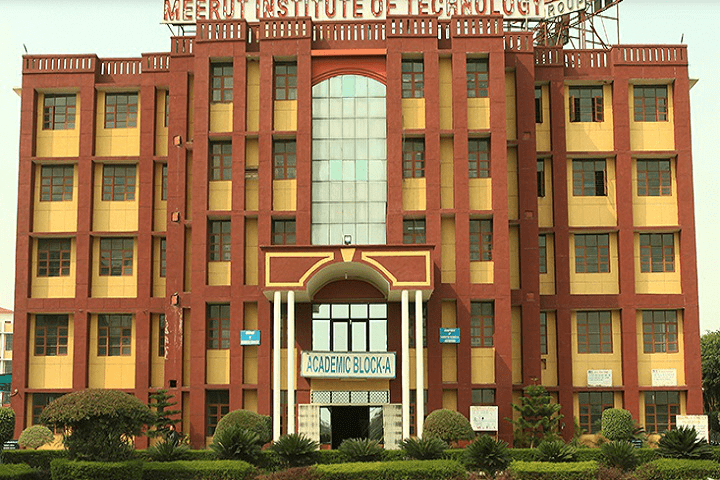
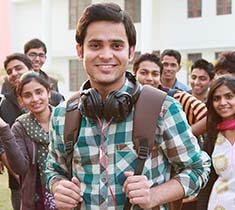
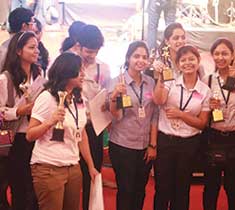
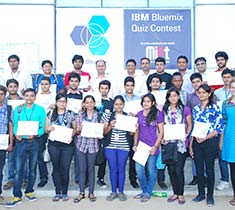
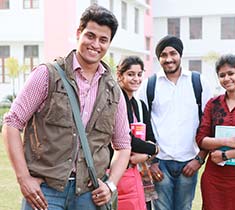


.png)



